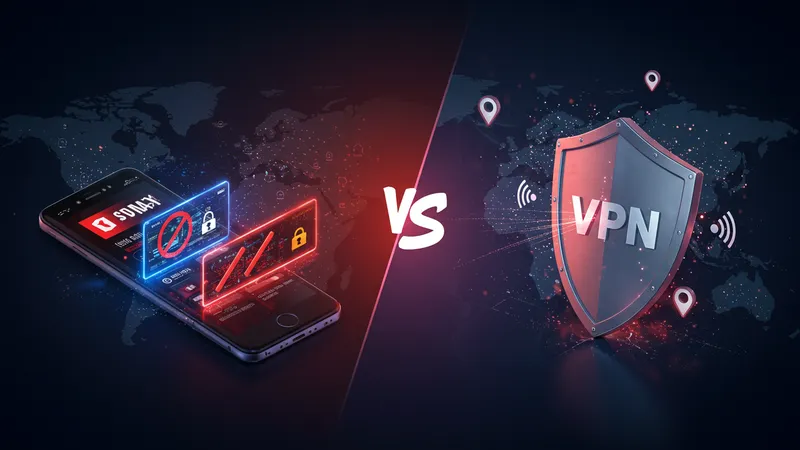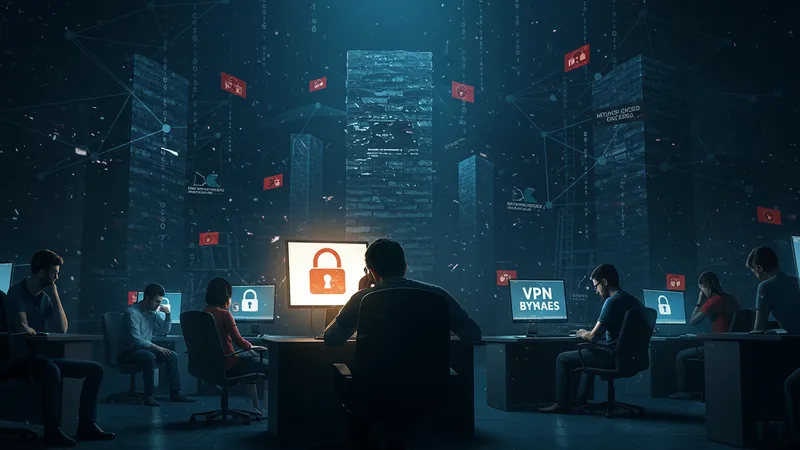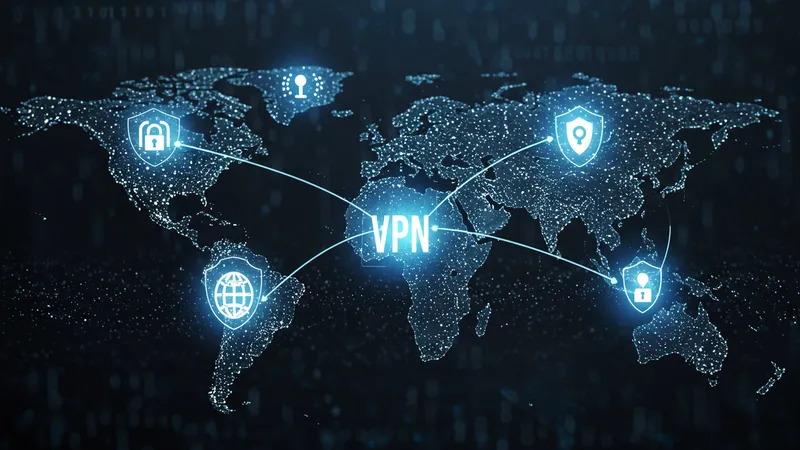Did you know that a staggering 64% of internet users don't realize how much their data is exposed online? Yes, your every click and keystroke could be vulnerable to prying eyes. It sounds like an exaggeration, but it’s happening right now.
As we dig deeper into the digital age, protecting our privacy has never been more crucial. VPN services, essential for safeguarding your online identity, are more popular than ever. But does everyone know what they're truly paying for?

Here’s a thing that most people don’t know: not all VPN services are created equal. Some promise you the moon but leave vast gaps open for data leaks. In fact, a renowned tech company recently discovered a so-called top-tier VPN wasn't encrypting user information as promised. But that’s not even the wildest part—there’s more to this than meets the eye.
It’s no secret that online anonymity is fast becoming an illusion for many. Yet, VPNs hold secrets that are far from user-friendly. One surprising yet overlooked fact is how some free VPNs actually make money from selling user data. Yes, instead of protecting you, they were the ones exposing your data. But what happens when even the most promising VPNs exhibit similar risks? The experts were shocked at what they uncovered next...
The revelations in the following pages will not only change how you choose your VPN but might also redefine your entire approach to online privacy. The reality waiting to be uncovered is nothing short of astonishing...
Encryption is the magical word that VPN services use to entice users. Sure, it sounds impenetrable, but do you really know what type of encryption you're dealing with? Many VPN providers tout AES-256 encryption as the industry standard, which is highly effective. However, as recent tests suggest, some VPNs employ weaker encryption protocols under certain conditions without users being aware. The fine print is where these discrepancies hide, and it often leaves user data more vulnerable than imagined.

What users don’t realize is that not all encryption methods are equal, and VPNs have been known to switch to outdated methods in the event of a technical hiccup. Imagine trusting a service to shield your data, only to find out they've downgraded their defenses during usage peaks. This is a piece of the puzzle that even tech-savvy individuals overlook, forgetting that the “illusion of security” could be the real threat.
The truth lies in the technical details that these services often obscure. They bet on the fact that the average user won’t dig deep enough to discover what's truly going on behind the virtual curtain. Most users just want seamless browsing without realizing that the wrong VPN choice could open the floodgates to data breaches.
What you’ll learn next about the VPN industry might surprise you even further, with one industry whistleblower revealing startling details of routinely used practices that compromise user trust—for profit. The next revelation is bound to add another layer to the complexity of VPN service choices...
While paid VPNs have their pitfalls, the appeal of free VPNs leads to a whole new world of risks. At first glance, they appear to be altruistic protectors of your internet privacy. However, a closer look reveals a darker agenda. Many free VPNs are infamous for selling user data to third-party advertisers, contrary to the vehement privacy promises they make.

Even more alarming is the fact that some of these services harbor malicious ads that compromise your device’s security. Case studies show that unsuspecting users found themselves victims of phishing attacks—thanks to the very VPN meant to protect them. Shockingly, the data suggests that 38% of free VPNs contain malware. But there’s one more twist you need to know...
The cost of free VPNs? Not monetary, but something far more valuable—your privacy. Users are unknowingly trading their data, assuming their activities are cloaked in security. Hidden clauses in terms and conditions allow extensive tracking, nullifying the premise of anonymity. But what lies in wait next is even more jaw-dropping.
These findings paint a picture bleaker than most privacy enthusiasts anticipated. Understanding these hidden costs is paramount as we uncover the more subtle risks involved. What you read next might change how you see this forever...
One of the most contentious issues with VPN services is the logging of user data. While VPNs are marketed as privacy champions, some actually maintain extensive logs of user activity. But here’s the kicker—these logs can be handed over to authorities or exploited in data breaches!

Major VPN players assure users with “no logs” policies, a promise that implies absolute anonymity. However, investigations have unearthed that several renowned services have ‘accidental’ logging instances. These logs, amassed unbeknownst to users, chronicle the exact opposite of privacy, serving as a digital roadmap of activity.
But how do these services continue to thrive with such practices? For some, it's all about jurisdiction and clever technical semantics allowing them to state no 'connection' logs, but omitting the fact they keep metadata and timestamps. These loopholes effectively bypass user expectations, leaving their data exposed.
The ramifications are immense when users discover the extent of information retained by supposed no-log VPNs. Trust is shattered as reality exposes the false sanctuary presented. But beyond these findings lies yet another surprising aspect of VPN services that’s less discussed...
Many users overlook the significance of the jurisdiction under which a VPN operates. Countries with stringent surveillance laws, even when hosting VPN services, can place real constraints on user privacy. For instance, VPNs headquartered in the '14 Eyes' countries, like the US and UK, might be compelled to share data with governments.

It’s a startling revelation—places you thought safe and neutral are often the most hazardous for online anonymity. While privacy laws differ greatly around the world, the jurisdictions in these alliances enable expansive intelligence sharing, which contradicts the principle of unfettered internet freedom.
What many don’t realize is how a VPN’s base location can dictate the level of privacy offered. This geographical oversight significantly influences the protection level, trapping users in a web of surveillance. Choosing a provider located in privacy-friendly territories can mitigate these concerns.
These jurisdictional nuances are another layer of complexity that embody the challenging terrain of VPN choices. Exploring further, you’ll grasp the urgency of understanding these international privacy dynamics—knowledge crucial to making the right decision...
Have you ever considered how bandwidth allocation affects your VPN experience? Premium users often don’t realize how limited bandwidth on most VPNs might throttle their connection speed, especially if the provider oversells its capacity. This tug of war between speed and security can be a deterrent for most.

The reality is, many users don’t consider bandwidth caps when signing up, only to face dismal speeds during peak usage times. This chokes data streams, making the very internet benefits you seek to protect a source of constant frustration. A high-speed promise can crumble under these hidden restrictions.
But there’s a silver lining—knowing which providers truly offer unlimited bandwidth is key. These unrestricted experiences are the golden ticket to fast, unrestricted browsing, without the unsettling slowdowns. Digging deeper reveals how to navigate these choked connections to obtain ultimate VPN performance.
Unraveling these bandwidth intricacies allows you to sidestep a frustrating and common problem plaguing many VPN users. The revelations that follow delve even deeper into these service challenges, uncovering details that will reshape your expectations...
Consumers popularize VPNs for streaming – geographic barriers should be no match for your favorite series, right? Surprisingly, that’s not always the case. Streaming services have fought back, implementing advanced VPN blocking methods to prevent unauthorized access. The arms race is real, and many VPNs falter under pressure.

Drivers of this struggle are the complex licensing agreements that streaming giants must adhere to, region-locking their content. As a user hoping for unrestricted access, it’s jarring to learn that not all VPNs circumvent these geo-blocks successfully—even amidst claims to the contrary.
The changing landscape means only a select few VPNs consistently triumph in bypassing these blocks. This competition creates a constant shuffle among providers to maintain usability in streaming. Identifying the reliable ones is essential, avoiding headaches of service disruption or enforced limitations.
Streaming fans must therefore stay informed about which VPNs withstand these blocks, each offering differing levels of access to coveted content. Exploring the next discovery, we spotlight how VPN technology continues evolving, reshaping streaming entertainment...
Public WiFi networks are notorious hotbeds for hackers, with users unaware of the risks lurking as they innocently browse. VPNs are seen as the first line of defense against these threats, encrypting data and fortifying personal privacy. However, not all deliver on this safeguard promise.

Many free hotspots leverage vulnerable systems packed with unsecured networks, ready to exploit unwary patrons. Intriguingly, it's often the less flashy VPNs that provide the most robust shield in these scenarios, defeating the misconception that only well-known brands possess the best security protocols.
Interestingly, VPN services can considerably reduce the chances of your data being captured in these high-risk areas. But how do you distinguish between those that genuinely deliver protective measures and those that merely capitalize on fear? Exploring this differentiator further could change your approach to safe surfing.
Transforming how you engage online despite potential threats is essential. Understanding the fine print and selecting wisely has significant implications for outsmarting digital thieves in public zones. The coming insights could revolutionize your VPN strategy...
For online gamers, smooth connectivity and low latency are non-negotiable. VPNs, with their ability to mask IP addresses, have upended conventional wisdom about gaming security. Surprisingly, not all VPNs excel in providing competitive gaming advantages, particularly concerning speed and latency—a fact overlooked by many.

The lure of VPN services is to offer gamers reduced ping and a seamless playing experience, which is not always the case. Some notable providers actually increase lag or restrict bandwidth, impairing gaming sensations. Unveiling the truth about these discrepancies is critical for enhancing play and outmaneuvering potential threats.
Knowledgeable gamers know that the right VPN can prevent data throttling and DDoS attacks. But with a multitude of options, how can they pinpoint those that truly provide optimized gaming conditions? Evaluating this overlooked aspect might be what stands between you and the ultimate victory.
It’s time to dispel myths and embrace the specifics of choosing a purpose-built VPN for gaming. The subsequent pages unfold more surprising truths that may redefine your digital battles...
Corporate entities increasingly rely on VPNs to secure their data. Yet, many overestimate their capabilities, believing that any VPN is suitable for business security. This assumption may prove costly, as not all offer the enterprise-level protection required.

The corporate sector sees constant threats from cyber espionage and data leaks. Yet the assumption that mainstream consumer VPNs suffice in warding off such attacks exposes companies to undesired vulnerabilities. Prioritizing thorough vetting processes for selecting enterprise-specific VPNs is instrumental to integrity.
Businesses must weigh the reputation, ethics, and reliability of prospective VPN providers to maintain uncompromised communication channels. This scrutiny ensures accountability, deterring any lapse in protecting client and employee data. Failure in this leads to catastrophic breaches and loss of credibility.
Enlightened decision-making regarding organizational VPNs has far-reaching benefits, demanding a pivot toward recognition of reliable, secure, and adaptable solutions. Proceed with us as we dissect this complex corporate conundrum further...
The rise of internet censorship has made VPNs a lifeline for users in restrictive regions. They promise to unlock world's access; however, not all VPNs successfully bypass sophisticated firewalls. Unfortunately, some users face bleak realities when confronted with stringent regional restrictions still in place.

Despite marketing claims, the effectiveness of a VPN in bypassing censorship depends heavily on its technological infrastructure. Some countries employ advanced tactics to block VPN access, such as deep packet inspection, presenting unique challenges that only the most robust services can overcome.
Understanding which VPNs can consistently bypass these restrictions is critical for individuals seeking information in censored environments. This knowledge can significantly enhance freedoms, ensuring access to uncensored narratives and preventing societal control through information limitation.
With censorship mechanisms growing ever more complex, discerning the depth of your VPN’s bypass capabilities has never been more vital. Our next insights illuminate solutions, diagnostics, and strategies to decode censorship barricades...
Their anonymity and privacy benefits notwithstanding, VPNs also carry ethical complexities that are hard to ignore. Many tout them as a shield for privacy-loving individuals. Yet, they are also adopted for less benign purposes, including bypassing legal obligations and privacy norms.

A balanced perspective requires understanding the moral nuance VPNs embody—where they emerge as both a liberating tool and a potential haven for illicit activities. Users must grapple with these ethical considerations to ensure their use adheres to personal values and reputable VPN practices.
Today, conscientious VPN use fosters transparency, aligning with ethical norms governing free internet access and responsible usage. The tech community faces increasing pressures to implement standards safeguarding trust without stifling freedom.
Evaluating these ethical markers prompts us to address holistic VPN utilization, pressing towards accountability amidst increasing technological empowerment. Turning next, we explore the guiding principles shaping this critical dialogue...
The future of VPN services is bound by innovation and regulation. As online landscapes evolve, so must our protective solutions. The increasing complexity of global internet protocol shifts and rising digital threats propel the growth and transformation of VPN technology.

A surge in collaborative, multi-faceted cybersecurity solutions points to the next chapter for VPNs. We anticipate standardized regulatory advancements that enhance service reliability and effectiveness while accommodating evolving privacy needs worldwide.
The expansion into decentralized VPN networks is positioned to reset conventional privacy paradigms, empowering users with unprecedented control over their data. The confluence of these tools represents a leap toward optimizing user experience within an ever-growing technological tapestry.
These future shifts necessitate astute awareness and adaptability, ensuring preparedness in navigating tomorrow’s digital frontier. Brace yourself as we uncover pivotal trends that shall redefine privacy mobilization and virtual freedom...
As we wrap this exploration, one essential takeaway is clear: not all VPNs are equal, and the stakes are high. Understanding service intricacies, jurisdictional influences, and technological prowess makes the difference between digital liberty and vulnerability. Share this article with those who need to rethink their online safety measures. Ensure your privacy protocols are as sound as they are practical!